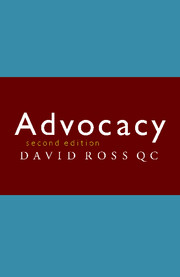Book contents
- Frontmatter
- Contents
- Foreword
- 1 The nature of advocacy
- 2 Preparation
- 3 Witnesses and questions
- 4 Examination-in-chief
- 5 Cross-examination: its qualities
- 6 Cross-examination: method and style
- 7 Cross-examination of experts
- 8 Cross-examination on documents
- 9 Re-examination
- 10 Admissibility, objections and submissions
- 11 The addresses
- 12 Plea in mitigation
- 13 Appeals
- 14 Legal writing
- 15 Etiquette and ethics
- Index
- Frontmatter
- Contents
- Foreword
- 1 The nature of advocacy
- 2 Preparation
- 3 Witnesses and questions
- 4 Examination-in-chief
- 5 Cross-examination: its qualities
- 6 Cross-examination: method and style
- 7 Cross-examination of experts
- 8 Cross-examination on documents
- 9 Re-examination
- 10 Admissibility, objections and submissions
- 11 The addresses
- 12 Plea in mitigation
- 13 Appeals
- 14 Legal writing
- 15 Etiquette and ethics
- Index
Summary
The nature of re-examination
[9000] After cross-examination has ended, you can ask further question of your witness. This is re-examination. Its main purpose is to remove or to explain away or to qualify the damage done to the evidence in cross-examination. If the damage were not explained or at least qualified, there would be prejudice to the party's case or discredit to the witness. More particularly, re-examination is designed to repair any distortion or incomplete account or ambiguity that cross-examination has produced. If there has been no cross-examination there cannot be re-examination.
[9005] The aims of re-examination are:
To remove ambiguities or uncertainties.
To restore facts in issue.
To revive the credit of the witness.
Is it necessary?
[9010] Re-examination is one of the hardest of the advocate's tasks. Unlike examination-in-chief and cross-examination it cannot be planned. The ill-advised re-examination can bring your case horribly unstuck. In cross-examination the first decision to make is whether it is necessary. The same applies to re-examination. You will have taken instructions as fully as possible. You will have watched your witness closely during your opponent's cross-examination. You must make a decision in the running on whether you should re-examine.
[9015] The factors you will take into account are these:
Has cross-examination damaged your party's case either on the facts or on the credit of your witness? If not, no re-examination is necessary.
Are there ambiguities that need to be explained?
If your case is damaged, can you diffuse it? If you don't know how, and you re-examine, the damage may be increased.
- Type
- Chapter
- Information
- Advocacy , pp. 100 - 107Publisher: Cambridge University PressPrint publication year: 2007



